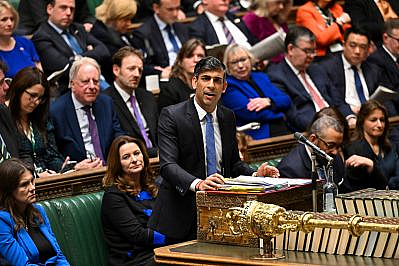Britain’s Parliament descended into chaos during the debate over a Gaza ceasefire resolution on Wednesday after the officially nonpartisan speaker of the House of Commons broke with precedent to allow Labour – his former party – to “hijack” the debate to avoid a party split.
Summary
Britain’s Parliament descended into chaos during the debate over a Gaza ceasefire resolution on Wednesday after the officially nonpartisan speaker of the House of Commons broke with precedent to allow Labour – his former party – to “hijack” the debate to avoid a party split.
- Furious MPs stormed out of the chamber in protest of Commons Speaker Lindsay Hoyle, who lawmakers accused of “hijacking” the debate to benefit his former party. Hoyle’s job is now in jeopardy after more than 1 in 10 MPs signed onto a petition demanding a no-confidence vote.
- Lawmakers were debating three separate symbolic resolutions related to the Israel-Hamas War on Wednesday, one each from the Conservative government, the Labour opposition, and the Scottish National Party, the leftist party that holds the third-largest amount of seats in the Commons.
- The vote carried a high degree of drama after anti-Israel protesters have poured into Britain’s streets in recent weeks, making some MPs fear for their safety. Many pro-Israel MPs have received death threats and the 2021 assassination of David Amess MP by an ISIS-affiliated terrorist still looms large in lawmakers’ minds.
- The SNP’s resolution demanded an immediate cease-fire that accused Israel of imposing “collective punishment” on Palestinians, a war crime. Wednesday was the SNP’s rare chance to control the debate as opposition parties are only offered select days to offer resolutions.
- The opposition Labour Party is deeply divided over how strongly they should criticize Israel’s conduct of the war. Had it been allowed to come up for a vote, the SNP’s inflammatory motion could’ve led to a rebellion among Labour MPs, threatening Keir Starmer’s leadership.
- Enter Lindsay Hoyle, a nominal independent who served as a Labour MP for two decades before ascending to the nonpartisan speakership role. Hoyle allowed a Labour resolution with mushy, softer language to come up for a vote, a controversial move that even his own top civil servant criticized.
- Hoyle’s decision effectively denied the SNP the chance to vote on its own resolution on its own opposition day while allowing Labour to avoid a dramatic party split. Dozens of SNP and Conservative MPs walked out of the chamber in protest, sending the Commons into turmoil.
- The governing Conservatives offered their own amendment calling for an “immediate humanitarian pause” and demanding Hamas free the remaining 130 Israeli hostages and surrender control of the Gaza Strip. The Tories withdrew their amendment to protest Hoyle.
- Hoyle eventually apologized – but only after the Labour resolution had passed. A livid Stephen Flynn, the SNP’s leader in the Commons, blasted Hoyle to his face and told him it would “take significant convincing that your position is not now intolerable.”
![]()
- Politico London Playbook broke down the major camps in a divided Commons. The “Get Hoyle camp” of SNP lawmakers and Conservative backbenchers, with some quiet allies in the Government, want to destroy Hoyle over his intervention. The government “save the Speaker” camp is attempting to turn the controversy against Labour and the “damage” their “weak and fickle leader” has done to Speaker Hoyle, as Leader of the House of Commons Penny Mordaunt put it.
- The Guardian contextualized why Wednesday became such an unprecedented snafu: “Confidence in the speaker – a figure who is supposed to be an honest broker and who traditionally stands unopposed by the main parties when they seek election as an independent – is now crumbling amid claims he buckled under pressure from his old party, Labour.”
- “The role of the Speaker is strictly apolitical. The Speaker presides over parliamentary debates and represents the House of Commons on ceremonial occasions and events. Although they are elected lawmakers, they must not be seen taking a stance on matters of politics or favoring any one party,” Time noted. “The speaker can at times take on the role of referee during heated debates and maintain order in the House by ensuring procedures are followed. The speaker can extend or shorten debate time before bills or motions are voted on.”
![]()
- “Underlying the parliamentary tug-of-war are rising tensions over the Israel-Hamas war, with hundreds of thousands of people marching through London last Saturday in support of the Palestinian cause and figures showing that the number of antisemitic incidents in the United Kingdom jumped almost 150% last year,” Fox News observed.
- Prime Minister “Rishi Sunak has criticised Sir Lindsay Hoyle’s “very concerning” handling of yesterday’s Gaza vote,” The Telegraph reported. “A total of 67 MPs have now signed a motion of no confidence in Sir Lindsay, the Commons Speaker, after his handling of a Gaza ceasefire debate yesterday resulted in chaotic scenes in Parliament on Wednesday night.”
- National Review covered the “growing antisemitism problem” in the UK. “An anti-Israel tide is sweeping the British Left, portending major challenges for a key democratic U.S. ally.”
© Dominic Moore, 2023






